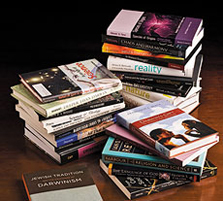
he
International Society for Science and Religion (ISSR) is the world’s
leading learned society in its field. It has embarked on a project to
establish a foundational library of the

most important texts dealing
with science and religion. This core library will be composed of 250
books, selected by a rigorous process to represent the most authoritative
writing scholars have produced on this subject.

“We’re now a few months into the project,” says Dr. Pranab Das who is
directing the program, “and we have developed a tiered selection process.”
This exhaustive procedure began with the compilation of a master list
of works nominated by members of the Society as well as by other colleagues
and organizations through the medium of an extensive website.

That resulted in a pool of 1,300 books which the membership was then
asked to cull, nominating outstanding works they thought deserving of
a place in the library. “We have nominated 300 texts so far. I look at
each of the nominated books and move some of them to the category of
finalist. We are now up to about 65 finalists.” The monthly meetings
of the editorial board decide the fate of each title, before considering
more finalists a month later. In this way, a kernel of approved texts
is gradually growing.

The project will also recruit around 20 contributing editors with expertise
in such areas as consciousness studies, biology, Eastern spiritual traditions,
etc. They will provide suggestions for books that will serve as support
material, beyond the immediate focus of science and religion. These will
supplement the core library, providing scholars and students with essential
background in many related disciplines.

When the final selection of 250 books has been made, Society members
will write brief critical essays on each title and these will be collected
into a volume to be called
The ISSR Companion to
Science and Religion which will be made available to the public through a commercial publisher.

The process of creating the set of uniform volumes that will constitute
the library is being conducted with an eye to economy. “What we are doing
is buying the books at substantial discounts from publishers in paperback,
then rebinding them in a uniform ISSR library cover so that they will
be one coherent group of very handsome, hard-bound, and durable books
that we can then make available to libraries,” explains Das.

In 2009, the Society will publish a competitive RFP inviting university
libraries and other centers, especially in the developing world, to apply
for a complete set. One hundred and fifty will be awarded. “To think
that collectively this group will be able to put together a new foundational
library for science and the human spirit is tremendously exciting.”



 he
International Society for Science and Religion (ISSR) is the world’s
leading learned society in its field. It has embarked on a project to
establish a foundational library of the
he
International Society for Science and Religion (ISSR) is the world’s
leading learned society in its field. It has embarked on a project to
establish a foundational library of the  most important texts dealing
with science and religion. This core library will be composed of 250
books, selected by a rigorous process to represent the most authoritative
writing scholars have produced on this subject.
most important texts dealing
with science and religion. This core library will be composed of 250
books, selected by a rigorous process to represent the most authoritative
writing scholars have produced on this subject.